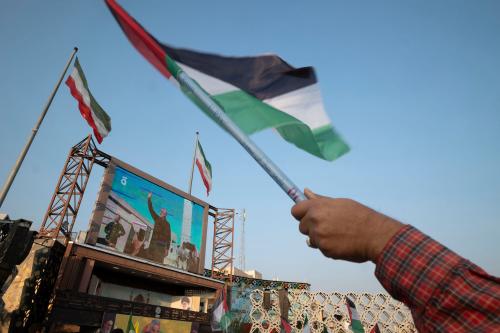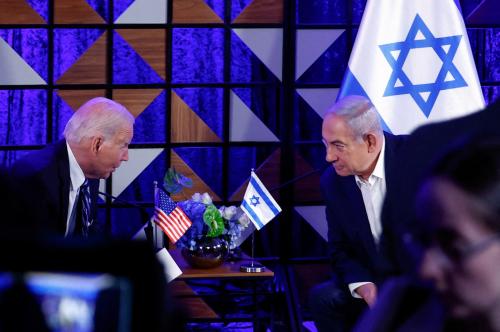The mind reels at the horror of the terrorist attacks in France. The body politic demands a reaction. And so a reaction there will be.
But we have learned to our cost (or should have) that societies often overreact to such outrages, to disastrous effect. The terrorist threat is to the lives of individual citizens. As the massive solidarity marches in Paris remind us, terrorists cannot undermine the core values of a free society. Only the society itself can do that. And an exaggerated sense of national peril is perhaps to the fastest route to societal self-destruction.
France should be well prepared to avoid this fate. The French have often looked back over the long arc of American counterterrorism errors and excesses—from Guantanamo, to the war in Iraq, to the torture scandal—and congratulated themselves on their relative prudence.
This self-perception ignores some of the ugly history of counterterrorism in France, but it does accurately reflect a remarkable process of learning. France has always been on the “bleeding edge” of terrorism, confronting the menace in all its guises—from bomb-throwing anarchists to transnational Islamist networks to lone wolf madmen. From this long and bloody struggle, France has developed an enormously effective, if at times controversial, system for fighting terrorism. As the threat of Islamist terrorism has risen around the world—and as France in particular has been publicly singled out as a target numerous times by terrorist groups from Algeria to Afghanistan—France has been largely immune from terrorist attacks by Islamist groups, foiling dozens of plots in the past 15 years.
That immunity was severely compromised last week when gunmen attacked a satirical magazine and a kosher butcher in Paris. The 17 deaths that resulted are a tragedy and a travesty. But they are not necessarily an indictment of France’s counterterrorism efforts. Perfection was never the standard for success. French counterterrorism officials, in contrast to many of their American colleagues, have long held that terrorism is a feature of modern life. Like crime, it cannot be eradicated, only managed and controlled.
In the days after 9/11, French officials recoiled from the language of the “War on Terror,” even as they acknowledged the threat. “War” implies military means and a quest for ultimate victory. But for the French, fighting terrorism has never been a war, but rather an endless struggle largely waged using law enforcement and intelligence tools. This approach has had its drawbacks, as judicial processes can be cumbersome and frustratingly unpredictable. But a succession of failures and scandals, particularly in the 1960s and ’70s, convinced French policymakers that only through such an approach could they manage the threat of terrorism without sacrificing the very values they so desperately desire to protect. And they were right.
Maintaining that approach after outrages such as those in Paris is always politically fraught. There is no easy formula, but past experience demonstrates that in the wake of such outrages, democratic societies tend to make certain mistakes, including:
• Overestimating the degree of central coordination of the terrorists
• Overestimating the foreign influence on the terrorists
• Blaming the security services for failures by using retrospective analysis
• Establishing excessive protection measures in the name of reassurance that ultimately increase fear, inhibit resilience, and do more to engender long-term alienation in target populations than to prevent terrorism
We can already detect hints of each of these errors in the early response of the French authorities, with thousands of troops sent into Paris, broad but uninformed condemnation of the failure to prevent the attack, and dark hints of broad international conspiracies. One wonders if the French approach to terrorism, so successful in achieving a rough balance between liberty and security, can survive this moment in France. For French Prime Minister Manuel Valls, the attacks in Paris require not just a war against terrorism but also a war “against jihadism, against radical Islam, against everything that is aimed at breaking fraternity, freedom, solidarity.”
Grand speeches, strong showings of force, and expansive language are the norm at a moment when a society feels threatened. But rhetoric and symbolism have consequences, and the politics of the moment in France make this a very risky path for French policymakers to tread.
The question of Muslim integration and immigration has become arguably the central issue in French politics. And as my colleague Jonathan Laurence has eloquently argued, “Marine Le Pen and the French Far Right are ready to seize the moment.” Le Pen’s Front National Party had already turned French fears of Muslim violence and Muslim cultural pollution into an effective political strategy.
The recent attacks will surely prompt the National Front, as well as other anti-immigrant parties throughout Europe, to double down on this strategy and will pressure more mainstream politicians to follow their lead. This response risks creating further divides between the traditional French population and France’s large Muslim population (some 5-8 million people), many of whom already feel alienated and oppressed. If this is combined with excessive, heavy-handed counterterrorism measures, it will not only increase the risk of terrorism, but even worse, it will exacerbate a host of social ills—from lack of integration to ghettoization of minorities to unemployment—that already plague France.
Responding to these attacks in a way that demonstrates resolve but does not make things worse will require French policymakers to act with considerable finesse and prudence—no small feat when fear, grief, and rage rule the day. But they must. Three idiots with automatic weapons can never truly threaten a great country like France. The true danger lies elsewhere.
This piece was first published on the Lawfare Blog.



Commentary
Op-edThe Foreign Policy Essay: Ceci n’est pas une guerre
January 18, 2015